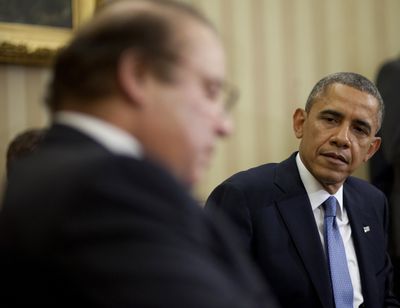Obama, Pakistani prime minister vow cooperation

WASHINGTON – Seeking to improve a rocky relationship, President Barack Obama and Pakistani Prime Minister Nawaz Sharif on Wednesday pledged cooperation on the security issues that have strained ties between their nations. But the sources of the long-standing tensions did briefly bubble to the surface.
Speaking alongside Obama in the Oval Office, Sharif said he raised the issue of American drone strikes during their two-hour meeting, “emphasizing the need for an end to such strikes.” For his part, Obama made no mention of drones, which have stoked widespread resentment in Pakistan where many believe the targeted strikes by the armed unmanned aircraft kill large numbers of civilians.
Despite the Pakistani concerns, the U.S. has shown no indication it is willing to abandon the attacks, even though the number has dropped in the past couple of years. The Pakistani government secretly supported the strikes in the past, and U.S. officials claim some key leaders still do.
The Washington Post, citing top-secret CIA documents and Pakistani diplomatic memos it had obtained, reported that top officials in Pakistan’s government have endorsed the program for years, if secretly, and routinely received classified briefings on strikes and casualty counts.
In a story posted Wednesday on its website, the Post reported that markings on the documents indicate that many of them were prepared by the CIA’s Counterterrorism Center specifically to be shared with Pakistan’s government. The documents, which detailed at least 65 strikes in Pakistan, are marked “top secret” but cleared for release to Pakistan, the newspaper reported.
Wednesday marked the first time Obama and Sharif have met since the Pakistani leader took office in June. And the mere fact that the talks took place was seen as a sign of progress after a particularly sour period in relations between the security partners.
Obama acknowledged that there will always be some tension between the U.S. and Pakistan, but said he and Sharif agreed to build a relationship based on mutual respect.
“It’s a challenge. It’s not easy,” Obama said. “We committed to working together and making sure that rather than this being a source of tension between our two countries, it can be a source of strength.”
Tensions peaked in 2011 following the U.S. raid inside Pakistan that killed Osama bin Laden and the accidental killing of two dozen Pakistani troops in an American airstrike along the Afghan border that same year. But there have been recent signs of progress, with Pakistan reopening supply routes to Afghanistan that were closed in retaliation for the accidental killing of its troops. And ahead of Sharif’s visit, the U.S. quietly decided to release more than $1.6 billion in military and economic aid to Pakistan that was suspended in 2011.